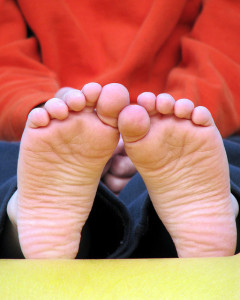Step Into Good Foot Health

Image via Care_SMC, used under a Creative Commons license
Through The Arc’s HealthMeet project, which provides free health assessments to individuals with IDD in 5 pilot states, we have unveiled some common health concerns affecting this population, one of these issues being poor foot health. Foot care is important because for most people, our feet are how we get around throughout the day. Discomfort in the feet can cause mobility issues and lead to an increased risk of falling.
Each foot contains 26 bones, 33 joints, and about 100 tendons, muscles, and ligaments. Keeping your feet strong and healthy will help to reduce pain and discomfort. Individuals with intellectual and developmental disabilities (IDD) can be at a higher risk for having foot pain due to bone or muscle deformities, or lack of access to adequate medical care.
Other factors that can contribute to foot pain are obesity and diabetes – both of which individuals with IDD have higher rates of than the general population. Our feet carry all of our body weight on them wherever we go, so individuals that are overweight are constantly putting more pressure and stress on their feet, which over time can cause muscles, tendons, and ligaments in the foot to stretch out and break down. Obesity can also lead to type 2 diabetes. Individuals that have diabetes are recommended to have an annual foot exam by a doctor or podiatrist due to the many complications that can come from having “diabetic foot”. Over time, diabetes can cause nerve and blood vessel damage resulting in less feeling or numbness and less blood circulation to your feet. A person may not be able to feel when they cut their foot or if something is rubbing against their foot causing open sores. These sores and cuts can then go unnoticed for days. With the lack of blood circulating to the foot due to damaged blood vessels, the healing process is slowed down, letting infections develop. Even if an individual is not able to use their legs or feet, they still need to be checked to ensure they are healthy and free of infections.
Some individuals with IDD that are less verbal may not be able to express the pain that they are feeling in their feet or think the constant pain is normal. This distress could result in moodiness and lack of desire to be physical active. Communication between individuals with IDD and their caretakers and physicians is essential to maintaining good foot health.
Below are some things you can do to make sure that proper foot care is occurring to prevent foot pain and infections:
- Maintain a healthy weight – excessive weight leads to more pressure that can cause foot/heel pain or arthritis
- Wear shoes with good supports – for extreme cases of flat feet, etc. orthotics that are made to fit an individual’s specific foot may be needed
- Wash feet every day with warm water and in between toes
- Inspect feet every day for sores, cuts, and blisters and make sure to clean out properly
- Trim toenails – make sure not to trim too short which could lead to ingrown toenails
- Don’t go barefoot in areas where there can be sharp objects or rocks that can cut the bottom of your feet
- Use sunscreen on your feet– the skin on the top/bottom of your feet can be especially sensitive to sun exposure and overlooked when applying sunscreen








